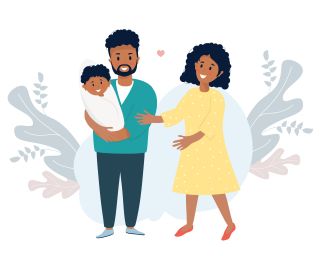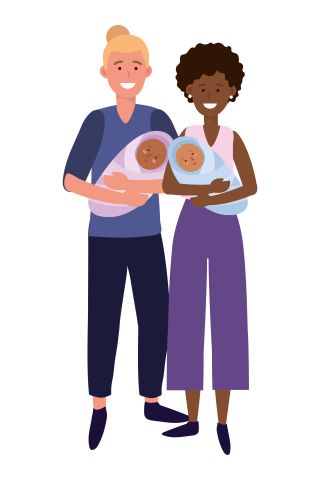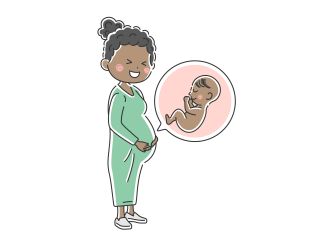Infertility
Why Is There a Shortage of Black Egg and Sperm Donors?
Creating a more diverse donor landscape.
Posted July 27, 2023 Reviewed by Jessica Schrader
Key points
- Black women and couples needing donors to create their families often find a shortage of Black gamete donors.
- There is stigma, a lack of representation, and a mistrust of reproductive medicine institutions/professionals.
- It's essential to approach gamete donation with cultural sensitivity and respect for diverse beliefs.

One U.S. sperm bank offers celebrity “lookalike” sperm donors, where you can choose a Ben Affleck- or a David Beckham-looking donor. But you probably won't see Idris Elba on that list or much melanin in the photos of the babies up on the walls of any other fertility clinic or sperm bank.
Black women who seek donors to create their families come up against a shortage of Black sperm and egg donors. These women may be single mothers by choice (SMC), LGBTQ+, or might be experiencing infertility themselves or with their partners. Less than 2% (5 of the 255) of donors at one of the two largest U.S. sperm banks are African-American and less than 3.5% (12 of 357) are African-American at the other. This isn’t just a U.S. problem, as both of these sperm banks ship sperm to many countries around the world. Finding local Black egg and sperm donors can also be difficult in many other countries, such as the U.K.
Some reasons for the shortage of African-American donors
- The failure of sperm banks and egg facilities to successfully recruit Black donors.
- A lack of adequate Black representation in reproductive literature, education, outreach, communication channels, fertility clinics, and staff. For Black women, the isolation of infertility is compounded by barriers to treatments.
- Mistrust of professionals and medical institutions because of a legacy of historical racial discrimination. Racial and ethnic differences exist in all facets of reproductive medicine, from birth to menopause.
- Fear of family and/or of community non-acceptance and judgment.
- A lack of diversity of people looking to purchase eggs or sperm. African-Americans are more likely to experience fertility issues compared to Caucasians but are less likely to seek treatment. One 2008 study in Fertility and Sterility reported that Black women are twice as likely as White women to have fertility challenges.

The American Society of Reproductive Medicine concluded that "the lack of people of color in key positions in our profession, the high price of treatment, inaccessibility of medical care, differences in success rates, lack of accessible patient education, and implicit biases and discrimination by some offices pose immense burdens to infertile individuals of diverse backgrounds, in same-sex relationships or who are without a partner.” The actual numbers of infertile Black women remain unclear because so few women of color have been included in infertility research and studies. African American women have been grossly underrepresented, so it’s really hard to quantify the rates or confront the impact of racism on infertility patients. Infertility could be twice as high for African American women, or even higher. Researchers can play a vital role in promoting diversity in donor accessibility and supporting individuals and families in their fertility journeys.

Stigmas, taboos, and challenges
Decisions regarding the use of donor gametes are highly personal and can vary among individuals and communities for a variety of reasons. Fertility can be a suppressed conversation in the Black community, as there may be cultural stigmas or religious taboos discouraging both potential donors and recipients. Fear of judgment from one’s family and/or community and possibly feeling shame or embarrassment about infertility, the choice to deliberately have a child on your own, being LGBTQ+, and/or using a donor from another race might also be present. Stigmas in the Black community may include:
Societal Perceptions. Stereotypes and misconceptions about fertility and family-building may be present within the Black community.
Religious Considerations. Religious beliefs and practices, in many cultures but specifically in the Black community, play a significant role in family-building decisions. Some religious teachings may have specific guidelines or restrictions regarding assisted reproductive technologies, including the use of donor gametes.
Biological Connection. In some cultural contexts, there is a strong emphasis on biological connection—with its lack viewed as a departure from traditional family norms, leading to concerns about maintaining biological ties.
Biracial Challenges. Being a biracial child can come with unique challenges and experiences due to navigating between two different racial and cultural identities. Some of the struggles that biracial individuals may encounter include imposter syndrome, racial prejudice and discrimination, cultural confusion, microaggressions, strained family dynamics, or a lack of cultural heritage. Supportive and understanding environments that validate their unique experiences and identities can play a crucial role in helping biracial donor-conceived individuals navigate these challenges and embrace their identity with pride.
Normalizing gamete donation
Here are some approaches that can help donor conception become a more accepted practice for the Black community:
- Education and awareness. It is crucial to educate communities about gamete donation and its impact on individuals struggling with infertility, SMC, LGBTQ+ families, and donor-conceived people. Efforts should include expanding the research and providing accurate information about the process, debunking misconceptions and disinformation, and addressing concerns specific to Black communities.
- Cultural sensitivity and support. It is essential to approach gamete donation with cultural sensitivity and respect for diverse beliefs and values. This includes providing information and support that addresses any concerns related to cultural identity, religion, family ties, and privacy.
- Addressing mistrust. Acknowledging historical mistrust and addressing it through transparent practices, open communication, and community engagement can help build trust in the reproductive medicine establishment and encourage more individuals to consider gamete donation and to feel comfortable with using a donor.
- Improving access. Seek to close the racial disparity gap in access to health care and collaborating with health care providers and community organizations are effective strategies to provide outreach programs and resources that spread the message and recruit potential donors.
- Inclusive advertising and marketing. Sperm banks and fertility clinics can actively strive for diversity in their staff, advertising, and marketing materials. By featuring diverse donors and families, they can send a welcoming message to potential donors from various backgrounds.
- Support and resources. Providing emotional support/counseling and educational materials/resources can help individuals feel more comfortable and confident. Building trust when deciding whether to donate or whether to use donor sperm or eggs is crucial.
It's important to approach these efforts with cultural sensitivity and ongoing evaluation to ensure their inclusivity and to address any specific concerns or challenges faced by Black communities. Collaboration between health care providers and mental health professionals who care for infertile couples, the LGBTQ+, SMC communities, and potential donors is vital for creating a more inclusive and diverse donor conception landscape.
Co-written with Eboni Camille Chillis, Ph.D.


